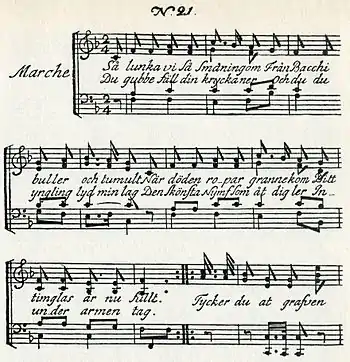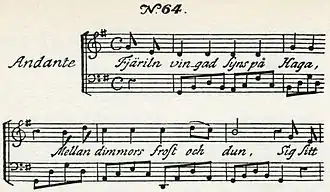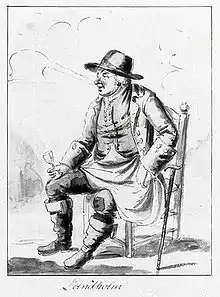Fredmans sånger
Fredmans sånger (in English, Fredman's Songs or Songs of Fredman) is a collection of 65 poems and songs published in 1791 by the Swedish poet Carl Michael Bellman.[1]

As a follow-up to Fredmans epistlar from the previous year, the book contains songs from a longer period. There are bible travesties ("Gubben Noak", "Gubben Loth och hans gamla Fru", "Joachim uti Babylon"), drinking songs ("Bacchi Proclama", "Til buteljen") and lyrical passages ("Fjäriln vingad syns på Haga").
Several of these songs including Gubben Noak and Fjäriln vingad are known by heart by many Swedes.[2]
Grouping of the songs
Bellman had public performances known as the Bacchi orden ("Order of Bacchus"). These consisted largely of travesties of the chivalric and society orders of the time, some of which Bellman himself was a member.[3] These orders held strict ceremonials, and members were often expected to live a decent and "christian life". To be knighted in the Order of Bacchus, the candidate had to have been observed publicly lying in a stupor in the gutter, at least twice. Several of the songs from these performances are collected in Songs of Fredman (songs 1–6).[3]
Songs 18–21 are about death.
Bellman wrote drinking songs and bible travesties, and also mixed the two genres. The holy men from the Old Testament were portrayed as drunks. The travesties became popular all over the country, being spread (anonymously) by broadsheets and transcripts. Some of Bellman's bible travesties offended the church authorities. As shown in a 1768 letter from the Lund chapter, the church attempted to collect all prints and transcripts in circulation of the most popular song, "Gubben Noach", as well as other songs.[3][4] "Gubben Noak" and eight other biblical travesties are included in Fredmans Sånger as songs number 35–43.[3]
Songs 47–54 are part of a song play about "Bacchus's bankruptcy" (Bacchi konkurs).[3] The other songs in the book are not naturally grouped by theme.[3]
Songs


| Number | First line | Notes |
|---|---|---|
| 1 | Bacchi Härolder med guld och beslag | |
| 2 | Ordens-Härolder ta'n Edra spiror | |
| 3 | Se menigheten | |
| 4 | Hör Pukor och Trompeter! | |
| 5a | Så vandra våre store män | |
| 5b | Se svarta böljans hvita drägg | A lament as Johan Glock is led across the waters by Charon. "Farewell to wine and double ale". |
| 5c | Så slår min Glock nu locket til | |
| 6 | Hör klockorna med ängsligt dån | On brandy-distiller Lundholm, dead. "If ever thy wife kiss'd thy chin in her life, she'd drunk have been." |
| 7 | Kärlek och Bacchus helgas min skål | To love and Bacchus. Rococo with Astrild and Venus. |
| 8 | Ack om vi hade, god' vänner, en Så | |
| 9 | Nå ödmjukaste tjenare, gunstig Herr Värd! | Song at dinner, celebrating food ... and drink |
| 10 | Supa klockan öfver tolf | Drinking song. If I become rich I'll buy new trousers, coat, new shoes... and have another drink before we die |
| 11 | Portugal, Spanjen, Stora Britannien | Allegretto in 3/8 time; bombs and rockets shall wake us with thunder, as our dragoons drink our health from crystal cups |
| 12 | Venus, Minerva | Rococo (Venus, Minerva, Pallas, Clio, Jupiter, Pluto, Apollo, "all Olympus", Bacchus, Pan, Sylva, Phoebus, Melpomene, Cupid) |
| 13 | Det var rätt curieust; i går aftons | Klubben Lokatten (the Lynx Tavern) |
| 14 | Hade jag sextusende daler | |
| 15 | Kom sköna Källar-flickor | |
| 16 | Är jag född så vil jag lefva | |
| 17 | I Januari månad, Gutår! | |
| 18 | Snart är jag rykt ur tidens sköte | |
| 19 | Ack! döden är en faslig björn | Death, Bacchus |
| 20 | Mina Björnar samlen eder | |
| 21 | Så lunka vi så småningom | The gravediggers discuss whether the grave is too deep, and drink brandy |
| 22 | Ach hör ett roligt giftermål! | |
| 23 | Så slutas våra Sorgedar | |
| 24 | Bortt vid en grind uti en skog | |
| 25 | Cornelius lefde femti år | |
| 26 | Ur vägen och vik | |
| 27 | Ur vägen För gamla Schmidtens bår! | |
| 28 | Movitz skulle bli Student | |
| 29 | Grannas Lasse! Klang på lyran | |
| 30 | Hör Trumpetarn, alarm! | |
| 31 | Opp Amaryllis! vakna min lilla! | Rococo (Amaryllis, Neptune, dolphins, naked sirens, Thyrsis) treatment of fishing |
| 32 | Träd fram du Nattens Gud | Aftonkväde (Evening poem); Rococo (Flora, Timanthes, Alexis, Pan, Neptune, Eol, Arachne, Vulcan, Pluto, Cyclops, fauns) |
| 33 | Magistraten uti T**** fiker | |
| 34 | På Gripsholm är alt för roligt | |
| 35 | Gubben Noach, Gubben Noach | Biblical travesty. "Noah rowed, Noah rowed, from his old ark, bought bottles, such as are sold, to drink, to drink, in our new park." |
| 36 | Gubben Loth och hans gamla Fru | Biblical travesty |
| 37 | Glada Bröder när vi dricka | |
| 38 | En Potiphars hustru med sköna maner | Biblical travesty |
| 39 | Alt förvandlas, alt går omkull! | |
| 40 | Ahasverus var så mägtig | Biblical travesty |
| 41 | Joachim uti Babylon | Biblical travesty. "Joachim from Babylon had a wife Susanna. Empty your flagon, Cheers for this person!" |
| 42 | Judith var en riker Enka | Biblical travesty |
| 43 | Adams skål, vår gamla far! | Biblical travesty on Adam and Eve. "To Adam's health, our old father!" ... "Let us drink" |
| 44 | Gamle bror Jockum, klang vid denna rågan! | |
| 45 | Om ödet mig skull' skicka | |
| 46 | M. Hur du dig vänder | |
| 47 | Bacchus snyfta, gret och stamma | |
| 48 | November den femtonde dagen | |
| 49 | Som nu och emedan | |
| 50 | Parterna syns kring Bacchus så röder | |
| 51 | Utterquist - Ja! | |
| 52 | Närvarande vid fluidum | |
| 53 | Som af Handlingarne, Bröder | |
| 54 | I närvarande Parter | |
| 55 | Mollberg höll flaskan och Bredström satt | |
| 56 | När jag har en plåt at dricka | |
| 57 | Sjung och läs nu Bacchi böner | |
| 58 | Nej fåfängt! hvart jag ser | |
| 59 | Har du något i flaskan qvar? | |
| 60 | Du har at fordra af mitt sinne | |
| 61 | Se god dag min vän, min frände | |
| 62 | Aldrig et ord! | |
| 63 | Mäster Petrus från det helga höga | |
| 64 | Fjäriln vingad syns på Haga | A song about King Gustav III's Hagaparken. Most Swedes can sing this unaided. |
| 65 | Så ser jag ut vid stranden | |
Persons
The songs portray a series of persons, mostly people lapsed into heavy drinking.[5] Named persons are Kolmodin (treasurer), Holmström, Nystedt (pub owner), Meissner (brewer), Steindecker (royal kettledrummer), Lundholm (brewer and distiller), Appelstubbe (customs officer), Österman (workshop owner), Halling (baker), Agrell (customs officer), Kämpendal, Nybom, Planberg, Joseph Israelson (student and poet) and Knapen (musician). In addition to these are the biblical figures such as Adam and Susanna; and the characters from classical mythology Bacchus and Venus, plus a few more.
References
| Wikisource has original text related to this article: |
- Bellman, Carl Michael (1791). "Fredmans sånger". Project Runeberg (in Swedish). Retrieved 2008-10-11.
- Berglund, Anders. "100 sånger - som (nästan) alla kan utantill! (100 songs - that (nearly) everyone knows by heart)" (PDF) (in Swedish). Musik att minnas. Retrieved 10 March 2016.
- "Bellman. Verken" (in Swedish). Retrieved 2008-10-16.
- Domkapitlet i Lund (1768). "Som til Consistorium blifwit inlemnade ..." (in Swedish). Retrieved 2008-10-16.
- "Personerna i Fredmans Epistlar och Sånger" (in Swedish). Retrieved 2008-10-17.

